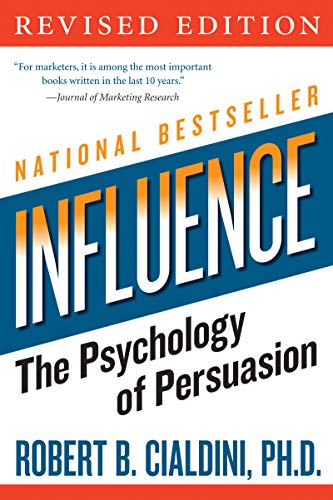Overview of “Influence: The Psychology of Persuasion” by Robert B. Cialdini Link to heading
Summary Link to heading
“Influence: The Psychology of Persuasion” by Robert B. Cialdini explores the psychology behind why people say “yes” and how that understanding can be leveraged to become a skilled persuader. The book delves into six fundamental principles of persuasion:
- Reciprocity - The obligation people feel to return favors.
- Commitment and Consistency - The drive to align with one’s prior commitments and beliefs.
- Social Proof - The tendency to look to others to determine correct behavior.
- Liking - The propensity to be influenced by people we like.
- Authority - The inclination to follow credible and knowledgeable experts.
- Scarcity - The perception that rare things are more valuable.
Cialdini supports these principles with a wealth of anecdotes, scientific research, and examples from various sectors, illustrating how these elements of persuasion operate in real-world scenarios.
Review Link to heading
“Influence” is lauded for its insightful and practical analysis of the mechanisms of persuasion. Cialdini’s ability to blend research with accessible storytelling has cemented this work as a seminal text in both psychology and marketing. One of its strengths is the real-life applicability of its concepts, making it a valuable read for professionals across fields—from sales and marketing to leadership and negotiation. However, some readers find the repetition within the book a bit tedious, as examples sometimes overlap or feel extended. Despite this, its clarity and practical guidance make it essential reading for anyone interested in understanding human behavior and influence.
Key Takeaways Link to heading
- Understanding the reciprocity principle can aid in creating mutually beneficial relationships, as people generally feel compelled to return favors.
- Consistency is a strong behavioral driver; small initial commitments can lead to larger future commitments.
- Demonstrating social proof can enhance credibility and influence decisions, as people often look to others for cues on how to act.
- Cultivating likability can significantly enhance one’s persuasive abilities; people are more inclined to say “yes” to those they like.
- Asserting authority, through credible knowledge or experiences, can lead to automatic compliance from others.
- Emphasizing scarcity, or limited availability, can heighten interest and demand, driving people to act swiftly.
Recommendation Link to heading
“Influence: The Psychology of Persuasion” is recommended for anyone interested in understanding the dynamics of human behavior and influence—particularly professionals in marketing, sales, leadership, or negotiation roles. The book provides actionable insights that can enhance one’s persuasiveness ethically and effectively. Additionally, it may benefit readers interested in psychology and consumer behavior, providing a deeper understanding of how influence shapes decisions and actions.
